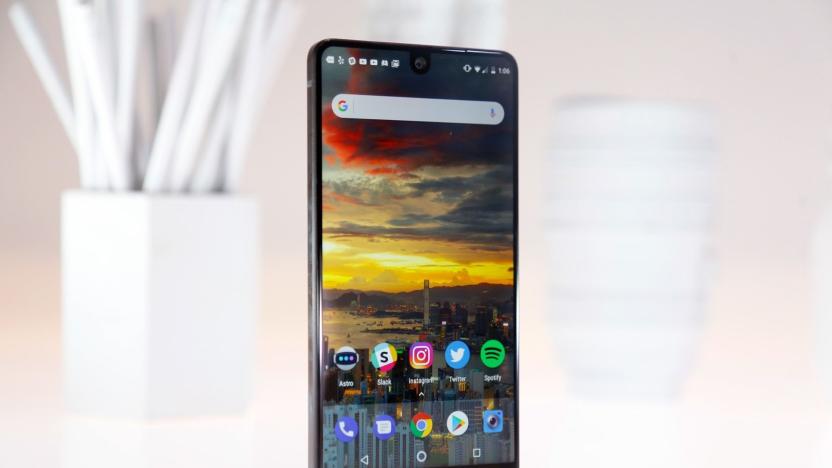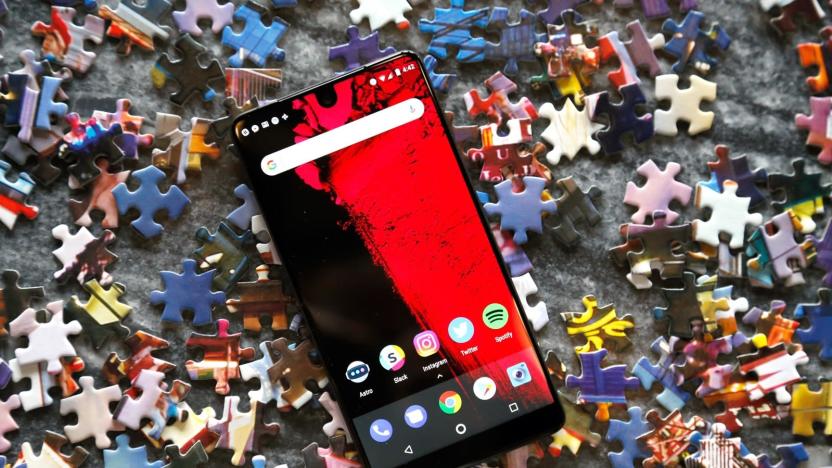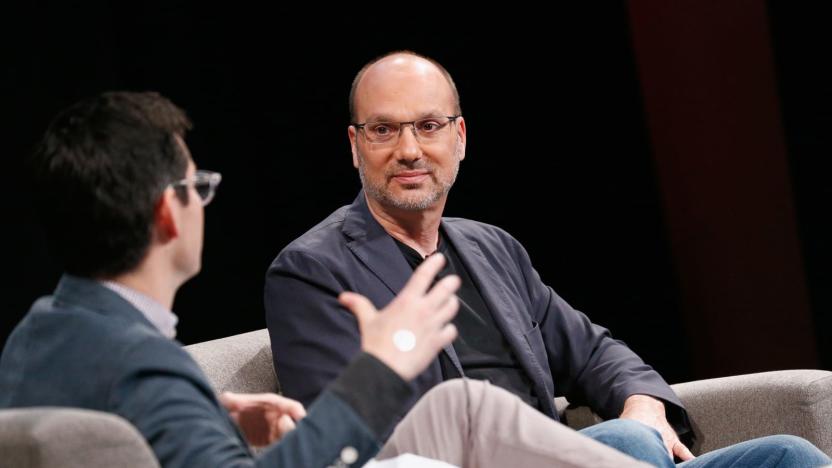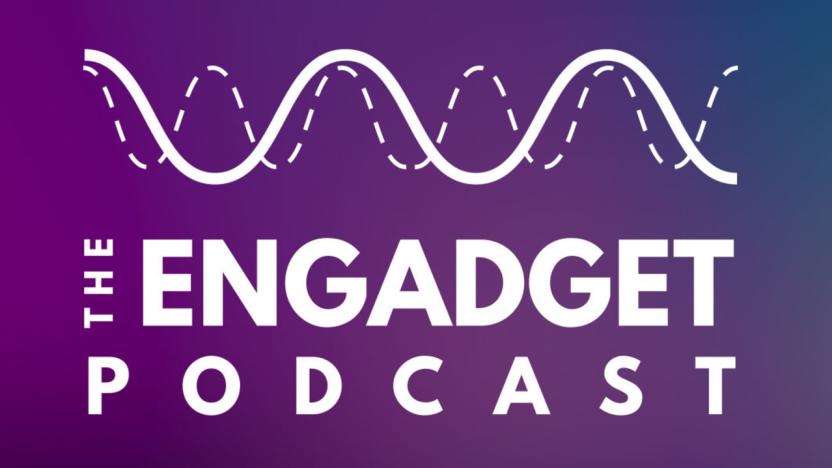Andy Rubin
Latest

Carl Pei's Nothing has acquired the branding of defunct phone brand Essential
Nothing, the new startup from OnePlus co-founder Carl Pei, is now the sole owner of the Essential brand.

Essential designer shows off the phones that might've been
Earlier this year, Essential, Android creator Andy Rubin's once high-profile phone startup, shut down. Besides Project Gem, a concept device it teased late last year, the company had released only one phone: the striking but flawed Essential Phone. However, now we have some idea of what could have been had Essential made more devices.

Andy Rubin's Essential is shutting down
Essential, Android creator Andy Rubin's high-profile phone startup, is shutting down. As a result of the shutdown, Essential says it will no longer support the Essential Phone with further security updates or customer support. Additionally, Newton Mail, which Essential acquired when it purchased developer CloudMagic in 2018, will stop working on May 1st.

Andy Rubin quietly left the venture company he founded
Disgraced former Google exec Andy Rubin has lost another one of his ties to Silicon Valley earlier in 2019. BuzzFeed News has obtained documents indicating that Playground Global, the venture company Rubin founded in 2015, "ended [its] business relationship" with its creator at the end of May. He remained a "good friend" of the company, but no longer had a position or financial stake. The reasons for the exit weren't mentioned.

The Engadget Podcast: Is macOS Catalina Apple's Vista?
MacOS Catalina is here, and it's... kind of a mess. In this episode, Devindra and Cherlynn are joined by Engadget Editor-in-Chief Dana Wollman to discuss Apple's latest desktop OS. The big question: Is Catalina Apple's Vista? (Pro-tip: Don't rush to upgrade.) We also ponder what Google will show off at next week's Pixel event; chat about PG&E's widespread power outages in California; and dive into the weirdness of Andy's Rubin's latest Essential phone, Project Gem. Listen below, or subscribe on your podcast app of choice. If you've got suggestions or topics you'd like covered on the show, be sure to email us or drop a note in the comments! And be sure to check out our other podcasts, the Morning After and Engadget News! Subscribe! iTunes Pocket Casts Stitcher Google Play Music Links A rundown of MacOS Catalina issues Our MacOS Catalina preview What to expect at the Made by Google event Our California power outage explainer Andy Rubin shows off Project Gem Credits Hosts: Devindra Hardawar and Cherlynn Low Producer: Ben Ellman Music: Terrence O'Brien

Andy Rubin shows off 'Project Gem' phone with a 'radically different formfactor'
We've seen phones of many shapes and sizes over the years, but it looks like Essential's next device could go in yet another direction. Android co-founder, Essential CEO and recipient of a reported $90 million payout from Google after a sexual misconduct investigation Andy Rubin posted pictures of a new device on Twitter that is taller and thinner than you're used to seeing, pointing out a "new UI for a radically different formfactor." He didn't mention the Boston Dynamics SpotMini robot in the background. Other images and video showing the back of the device teased a "colorshift" material that changed shades from different angles. Last December Essential announced its debut PH-1 phone was effectively discontinued, but promised a follow-up device and has continued releasing software updates. In a world where phone screens keep getting bigger and wider -- including fold-out displays and second screens -- going taller to adjust the placement of important info and notifications is certainly one way to stand out. Last year Rubin suggested a way to solve phone addiction is by moving to a "relatively small" screen combined with software that responds mostly to voice commands -- is this it? Update: The Essential Products Twitter account posted two more pictures of the device with the hashtag #ProjectGem. Saying it's in early testing, the post told readers "We've been working on a new device to reframe your perspective on mobile." Take a look below and see if that's true.

Lawsuit accuses Google of hefty payouts to execs accused of misconduct
Google's handling of sexual misconduct by executives is coming under more scrutiny thanks to new details emerging from a shareholder lawsuit. Investors have claimed Google chief Larry Page granted Android creator Andy Rubin a $150 million stock grant without seeking approval of the board first, even though Rubin was under an investigation at the time. Page instead got "rubber stamp" approval eight days after the fact, according to the suit. It's not certain if he was aware of the investigation.

Google lends its robot expertise to help boost Foxconn's assembly lines
As the world's biggest electronics manufacturer, Foxconn has often been there to help Google. It provides the nuts and bolts for Glass, after all. However, a new report suggests Google's continued investment in robotics has put it in a position to give something back, using its own technology to better automate Foxconn's assembly robots. The Wall Street Journal reports that Google's Andy Rubin, the man who once led Android and now directs Mountain View's robotics efforts, recently met with Foxconn chairman Terry Gou to help "speed up robot deployment" at Hon Hai factories, with a view to integrating one of Google's own engineering companies later down the line. Google, of course, acquired BigDog-maker Boston Dynamics late last year, snatching up an additional seven technology companies to help it realize its robotic dreams. As it stands, Google and Foxconn's partnership will initially focus on improving the efficiency of the Taiwanese company's robot workforce, as it looks to mitigate against rising labor costs and improve production yields. Google is also tipped to turn its robots loose on Amazon, with Jeff Bezos' retail business reportedly fixed firmly in its crosshairs.

When Google engineers first learned about the iPhone: 'What we had suddenly looked just so . . . nineties'
The iPhone turned the tech world on its head and ushered in the modern era of the smartphone. In unveiling the iPhone, Apple not only captured the attention of the masses, but also delivered a huge kick in the arse to competitors who quickly realized that their current product roadmaps were instantly outdated. Steve Jobs famously called Android a stolen product (in addition to promising to go thermonuclear on them), a point to which Android enthusiasts like to point out that Google actually acquired the Andy Rubin-led Android team in August 2005. Still, the type of product Android embodied drastically shifted once Jobs graced the stage at Macworld 2007 and revealed the iPhone for the very first time. In his new book, Dogfight: How Apple and Google went to War and Started a Revolution, Fred Vogelstein captures the reaction that many of the early Android engineers had upon learning of the iPhone. In short, many were shocked and soon came to the realization that the version of Android they had been working on for so many months would have to be scrapped. An iPhone-type experience was the future, and it was clear to many involved that they would have to follow suit. Vogelstein relays a quote from Google engineer Chris DeSalvo, who said, "As a consumer, I was blown away. I wanted one immediately. But as a Google engineer, I thought, 'We're going to have to start over.'" For most of Silicon Valley-including most of Google-the iPhone's unveiling on January 9, 2007 was something to celebrate. Jobs had once again done the impossible. Four years before he'd talked an intransigent music industry into letting him put their catalog on iTunes for ninety-nine cents a song. Now he had convinced a wireless carrier to let him build a revolutionary smartphone. But for the Google Android team, the iPhone was a kick in the stomach. "What we had suddenly looked just so . . . nineties," DeSalvo said. "It's just one of those things that are obvious when you see it." The significance of Jobs' iPhone announcement wasn't lost on Android chief and former Apple engineer Rubin. Vogelstein writes that Rubin at the time was in Las Vegas for the Consumer Electronics Show. Indeed, many at the time expressed astonishment that a lone company like Apple could completely upstage an event as storied and grandiose as CES. In any event, upon watching the Apple keynote, Rubin knew that his Android team had to re-evaluate its strategy. That's not to say that the Android models that Rubin and his team were working on were complete crap, but those devices lacked many of the features that made the iPhone so distinct and revolutionary. For instance, the Android models being developed at Google all sported traditional QWERTY keyboards, a feature Jobs lambasted during his keynote. Now to be fair, the iPhone didn't catch just the Android folks off-guard; it caught everyone off-guard. If you go back and look at many of the early iPhone rumors that circulated before January 2007, even the most ambitious predictions and outlandish mockups absolutely paled in comparison to what Apple actually had in store. Further, other companies were just as astonished by Jobs' iPhone introduction. A former RIM employee, for instance, recounted how many folks inside RIM were in disbelief following the iPhone introduction. All these companies were fighting over what amounts to overgrown PDAs with phones and wireless stacks strapped on. Everyone assumed power density was no where even close to what was needed for general computing, that a full featured browser and heavy duty Internet services were impossible due to bandwidth and latency. Take a look at how our Java expert groups named standards, how people at the time talked about what features smart phones should have, and it's clear that no one thought an iPhone was possible. Even Danger, which eventually [led to] Windows Phone 7 and Android, was just working on a better Blackberry. I left RIM back in 2006 just months before the iPhone launched and I remember talking to friends from RIM and Microsoft about what their teams thought about it at the time. Everyone was utterly shocked. RIM was even in denial the day after the iPhone was announced with all-hands meets claiming all manner of weird things about iPhone: It couldn't do what they were demonstrating without an insanely power hungry processor; it must have terrible battery life, etc. Imagine their surprise when they disassembled an iPhone for the first time and found that the phone was battery with a tiny logic board strapped to it. It was ridiculous, it was brilliant. The folks working on Android, to their credit, were able to reverse course and steer Android in an iPhone-like direction. RIM, on the other hand, remained beholden to their QWERTY keyboards for far too long and we all saw how well that worked out for them.

Daily Roundup: Andy Rubin's Google robotics, Microsoft completes Nokia acquisition and more!
You might say the day is never really done in consumer technology news. Your workday, however, hopefully draws to a close at some point. This is the Daily Roundup on Engadget, a quick peek back at the top headlines for the past 24 hours -- all handpicked by the editors here at the site. Click on through the break, and enjoy.

The Daily Roundup for 02.26.2013
You might say the day is never really done in consumer technology news. Your workday, however, hopefully draws to a close at some point. This is the Daily Roundup on Engadget, a quick peek back at the top headlines for the past 24 hours -- all handpicked by the editors here at the site. Click on through the break, and enjoy.

Andy Rubin confirms 'no plans' for Google retail stores
If those Google retail rumors fuelled visions of whiling away some mall-time, thumbing at the latest Nexus gadgets in a parlor of their own, then Andy Rubin says keep dreaming. While there are some legitimate Google outposts to be found in stores, the Android chief has confirmed to journalists today that -- as far as he's concerned -- there's no need to explore bricks and mortar stores of their own. Rubin was adamant that there are no plans at this time -- and he's in a good position to know. The reason, however, isn't to do with the ageing model of retail, or a well pinned map of consumer behaviour patterns, with Rubin merely stating that he didn't think the Nexus line is quite at the stage that would warrant a store of its own, the same is true of it home-grown Chromebook devices. That's ok though, if you just gotta have that Nexus right now, there are still some options to explore.

Google drafts checklist for making top-notch Android tablet apps
Google's Senior Mobile VP Andy Rubin has been cool towards tablet apps, arguing that mobile titles shouldn't be tuned to a specific form factor. Whether you agree with that assessment or not, his company has produced an (arguably overdue) tablet app checklist to help developers with big screen ambitions. The step-by-step walkthrough tells developers how to make the most of all that free space and optimize for the larger hardware, touch input targets and widgets. There's a difference between having guidelines and getting app writers to follow them, but the checklist is an important step towards keeping that Galaxy Note 10.1 or Nexus 7 well-fed. [Thanks, Christopher]

Google Senior VP of Mobile: Aliyun OS 'under no requirement to be compatible', but it won't get help from Android ecosystem alliance
Andy Rubin has added another response to Alibaba's Aliyun OS, after Google's insistence that Acer put the launch of its new smartphone on pause. He focuses (again) on the Open Handset Alliance (OHA), which OEMs agree to when they work with the platform, promising to keep Android a happy (and relatively compatible) platform. Amazon dodges any similar issues with its Kindle Fire tablets, because it didn't sign up to the same alliance. Rubin says that because Aliyun uses Android's framework and tools -- as well as housing some suspect Android apps (and pirated Google programs) within its own App Store -- the mobile OS "takes advantage of all the hard work that's gone into that platform by the OHA." Google's looking to protect how Android behaves as a whole, and the senior VP suggests that if Alibaba's new OS wanted "to benefit from the Android ecosystem" then they could make the move across to full compatibility. We're still waiting to hear what Acer (and Alibaba) plan to do next. [Thanks Jimmy]

Google wants 'better compatibility' for Android, Alibaba says 'Aliyun is separate,' Acer takes the brunt of it
On Thursday, we starting hearing claims that Google had strong-armed Acer out of launching its A800 CloudMobile in China with the Aliyun operating system. We reached out to the search giant for its response, but they declined to comment. Over the last 24 hours, though, Google has attempted to explain its stance, but at the same time has potentially created some confusion about how open Android really is. Below is the initial statement received by Marketing Land: "Compatibility is at the heart of the Android ecosystem and ensures a consistent experience for developers, manufacturers and consumers. Non-compatible versions of Android, like Aliyun, weaken the ecosystem. All members of the Open Handset Alliance have committed to building one Android platform and to not ship non-compatible Android devices. This does not however, keep OHA members from participating in competing ecosystems." This is clearly outlining Google's intention to prevent forked Android spin-offs from diluting the platform and the user experience. Fair enough. The trouble seems to be, however, defining when something is Android compatible, rather than its own separate (albeit Android-based) operating system. Amazon's Kindle Fire will instantly spring to mind. The new tablets run on Ice Cream Sandwich, but are fenced-off from the official Play store and other Google offerings. As you can imagine, the debate has started to get a little heated, we go into it in more detail past the break.

Apple counts 400 million iOS devices sold as of June
Wondering just how well Apple's iOS device sales have been faring versus their Android counterparts? CEO Tim Cook has just revealed that Apple has sold (not just shipped) 400 million iOS devices from the 2007 launch through to June 2012, a hike from the 365 million it reported at WWDC. For context, Google's Andy Rubin mentioned just Tuesday that a total of 500 million Android devices had been activated, although the gap may be closer than implied at first: there's been a few months between then and now, after all. Still, the new tallies show that Google wasn't waiting for the iPhone 5 to quicken its pace, even if Apple's sales are still very brisk. Check out all the coverage at our iPhone 2012 event hub!

Google's Andy Rubin: Nexus 7 may head to retail, but we're not changing tablet app policies
We've got good news and bad news in equal measure for those pining after a Nexus 7 of their very own. If you're reluctant to spend that much hard-earned cash at the Google Play Store, Google's senior VP of mobile Andy Rubin has hinted to AllThingsD that the ASUS-made tablet could end up at retail stores before too long; the Play-only availability was just what Google had to mention at I/O. There could be some markup in other channels, given that Google is selling at what's very nearly wholesale prices. The bad news? Google won't be changing its attitude towards tablet-native apps anytime soon. Rubin sees Google Play content additions as key to driving Android tablet adoption, not the encouragement of tablet-specific app development -- he'd prefer the one-size-fits-all model. We'll see whether magazines and movie sales are enough to turn around so-so market share, but if you were hoping Rubin would address criticisms that Android tablet apps are just blown-up phone apps, you'll have to keep waiting.

Google's Andy Rubin: Android activations up to 900,000 a day, I'm staying put thank you
It's been awhile since we learned how many unique Android devices were switching on every day; the last time was at Mobile World Congress, when Google's senior mobile VP Andy Rubin confirmed 850,000 activations a day just as we were fruitlessly practicing our Catalan. He's now chiming in with word that the daily rate is up to 900,000 cellular-enabled phones and tablets as of June. That's a ways off from the breakneck pace of growth in 2011, but it certainly shows that Android is no shrinking violet just yet. Rubin's answer is ostensibly prompted by a need to debunk a rumor that he might be leaving Google -- there's "no plans" for that, he says. All the same, we're sure he doesn't mind ever-so-slightly deflating Apple's balloon before WWDC 2012 kicks off tomorrow. [Image credit: Jon Fingas, Flickr]

Google: 450,000 Android Apps now available to 300 million devices
If you hadn't noticed, it's Mobile World Congress this week and Google's showing off its enormous booth packed to the gills with smiling green Androids. Andy Rubin insouciantly added that the Android Marketplace has reached its latest milestone: there are now 450,000 apps available for the platform. Other pertinent stats are that over a billion apps are downloaded every month and that 850,000 Android devices are activated each day -- meaning that there's more than 300 million of them worldwide. Of course, that's not the real story here at MWC, it's that the company have brought along a bedazzling booth for guests to glue as many false jewels to their Galaxy Nexus back-plate as their self-respect can handle.

Android and iOS share a merry little Christmas: seven million total device activations
Google's SVP of Mobile just provided us with another glimpse inside the horse's mouth, claiming that Android scored 3.7 million new device activations over Christmas Eve and Christmas Day. To put that in context, Flurry reported that total Android and iOS activations on Christmas Day alone totaled 6.8 million. If we can accept a very high margin of error, and if we assume that the vast majority of Rubin's activations were on the 25th, then we might extrapolate a roughly even split between the two rival platforms. Considering where Android was just a couple of Christmas's ago, it's no wonder that Mr Rubin is in the tweeting mood.











